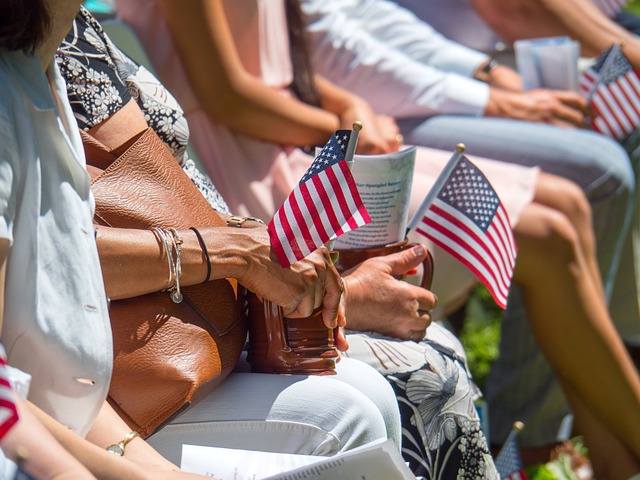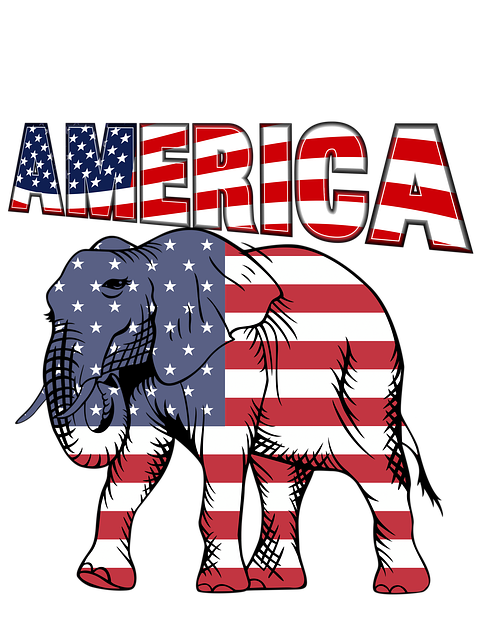The article emphasizes the centrality of "We the People" in the U.S. legal system, highlighting that citizens actively participate in and influence American law through civic engagement, discourse, and upholding legal norms. The American Flag is a key symbol representing national unity and the people's sovereignty, reminding us of the historical break from British rule and the ongoing responsibility of citizens to shape justice. It underscores that democratic ideals are realized through the active participation of individuals in both formal and informal aspects of legal processes. The dynamic relationship between "We the People" and the rule of law ensures the legal system reflects diverse values, safeguards constitutional rights, and maintains fairness. The American Flag's presence in courts reinforces national pride, respect for the law, and the people's authority to guide America's legal framework. It stands as a symbol of democratic ideals and justice, a silent homage to the collective will of Americans. The article also discusses how "We the People" have shaped the Constitution's interpretation through the courts, ensuring its relevance across generations by balancing respect for tradition with a willingness to adapt to changing societal values. The American Flag, with its fifteen stripes and stars, embodies this balance of continuity and change, symbolizing America's commitment to evolve while honoring its founding principles.
In the realm of law and justice, the phrases “We the People” and the iconic American Flag resonate as symbols of democracy and citizens’ pivotal roles. This article delves into the profound significance these emblems hold within the American legal system, exploring their foundational impact on civic engagement and jurisprudence. From examining the Constitution as a living document to understanding how ‘We the People’ directly shape American law, join us as we unravel the interwoven tapestry of civic duty and constitutional interpretation that defines our nation’s legal framework.
- We the People: The Foundational Role of Citizens in Law and Justice
- American Flag: Symbolism and Significance in Legal Contexts
- Civic Engagement: How 'We the People' Shape American Jurisprudence
- The Constitution as a Living Document: Interpreting 'We the People' Through Time
We the People: The Foundational Role of Citizens in Law and Justice

In the fabric of American law and justice, “We the People” is more than a phrase etched on the foundation of the nation’s judicial hallmark; it embodies the foundational role of citizens in upholding and evolving the legal system. The collective body of Americans, through their engagement, civil discourse, and adherence to legal principles, forms the cornerstone of a just society. The American Flag, a symbol of national unity and pride, stands as a testament to the sovereignty of the people, who are empowered to shape the course of justice. It is through the active participation of citizens that the ideals of democracy are actualized, ensuring that the legal landscape reflects the diverse values and aspirations of its populace. The engagement of citizens in both the formal and informal aspects of law and justice—from jury duty to community advocacy—underscores the dynamic nature of a system where “We the People” hold sway over the rule of law, thereby safeguarding the rights and liberties that are enshrined within the Constitution.
The role of citizens in law and justice is not a passive one; it demands vigilance, education, and active involvement. The American Flag, with its thirteen stripes and stars, symbolizes the original 13 colonies’ break from British rule and their subsequent establishment of a government “of the people, by the people, for the people.” This enduring motto underscores the importance of every citizen’s voice in the judicial process. From the courtrooms to the community halls, citizens are the pivotal actors who contribute to the legal discourse, ensuring that justice is not only served but is also seen to be served fairly and equitably. The ongoing evolution of law and justice reflects the living document nature of the Constitution, guided by the principle that it is the people who have the ultimate authority to shape the rule of law that governs their land.
American Flag: Symbolism and Significance in Legal Contexts

The American Flag, a potent symbol woven into the fabric of the nation’s identity, holds profound significance in legal contexts, serving as a tangible representation of “We the People.” Its fifteen stripes and stars, emblematic of the original thirteen colonies that rebelled against British rule, stand for the values of freedom, resilience, and unity. In courts across the United States, the Flag often takes center stage, not merely as a decorative element but as a bearer of meaning in legal proceedings. It is a silent testament to the sovereignty of the people, whose rights are safeguarded and adjudicated under its watchful emblem. The Flag’s presence can evoke a sense of patriotism, respect for the rule of law, and a reminder of the collective responsibility each citizen has in upholding the Constitution. Its display in legal settings is a visual affirmation that the laws are derived from the will of the people, and it underscores the notion that justice is administered equitably without partiality to any individual or group. The Flag’s role in legal contexts transcends its aesthetic value; it serves as a daily homage to the democratic principles upon which the country was founded, reminding all who enter the courtroom of their place within the larger body of citizens who are the authors of America’s constitutional narrative.
Civic Engagement: How 'We the People' Shape American Jurisprudence

The principle ‘We the People’ is a cornerstone of American jurisprudence, encapsulating the idea that the sovereignty of the United States resides with its citizens. This foundational concept, as articulated in the preamble to the Constitution and symbolized by the American Flag, underscores the role of civic engagement in shaping the nation’s legal landscape. The active participation of citizens in the judicial process—through jury service, legal advocacy, and community-based initiatives—serves as a testament to the democratic values upon which the country was founded. Citizens’ input into lawmaking, their role in public discourse on justice issues, and their vigilance in safeguarding constitutional rights are integral to the ongoing evolution of American jurisprudence. The American Flag, a ubiquitous symbol of national identity and unity, often serves as a rallying point for citizens advocating for legal reforms or upholding the rule of law. It is through this continuous dialogue and collective action that ‘We the People’ not only assert their authority but also guide the trajectory of legal precedents and judicial interpretations in the United States.
The Constitution as a Living Document: Interpreting 'We the People' Through Time

The Constitution of the United States stands as a testament to the enduring principles upon which the nation was founded. At its core, the document begins with the phrase “We the People,” signifying an inclusive representation of the American populace at the time of its drafting. Over the decades, this foundational statement has been interpreted and reinterpreted as the composition of ‘the People’ has evolved. The judiciary, through a series of decisions, has shaped the meaning of ‘We the People’ to reflect changing demographics and societal values while maintaining the integrity of the original intent. This dynamic process ensures that the Constitution remains relevant and responsive to contemporary issues, much like the American Flag that symbolizes unity and change over time. The interpretation of the Constitution as a living document is a critical aspect of its application in modern law and justice communities, allowing it to retain its relevance across different eras without being rigid or outdated. This adaptability has been crucial in maintaining the Constitution’s status as a guiding framework for American governance, ensuring that the rights and interests of all people are considered as ‘We the People’ continues to encompass an increasingly diverse nation. The Supreme Court, through its rulings, continually interprets constitutional provisions, often referencing the original intent of the Framers while also considering contemporary societal norms and legal precedents. This delicate balance between tradition and progress is essential for the Constitution to continue serving as a beacon of freedom and justice in the United States.
